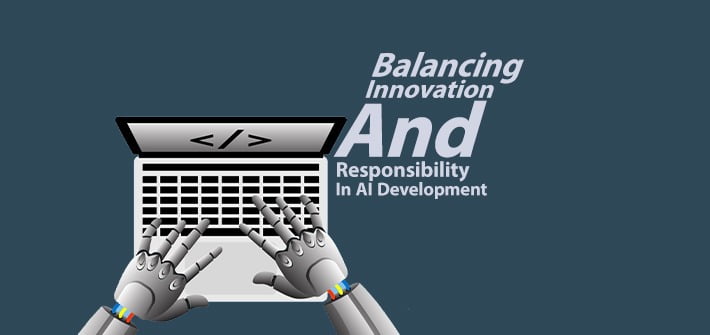Introduction
Ethical coding in AI: As the realm of Artificial Intelligence (AI) continues to expand, the ethical implications of coding practices become increasingly paramount. The intersection of innovation and responsibility is where the art of ethical coding takes center stage. In this article, we explore the significance of ethical considerations in AI development, the challenges posed by rapid advancements, and the imperative role of developers in shaping a responsible AI landscape.
Understanding Ethical Coding in AI
The Dual Nature of AI
The dual nature of AI refers to its potential for both groundbreaking innovation and ethical challenges. On one side, AI presents opportunities for revolutionary advancements, enhancing efficiency and capabilities across various industries. On the other side, ethical concerns arise due to issues like bias, privacy, and security. Navigating this dual nature requires a delicate balance to harness the benefits of AI while addressing its ethical implications.
Ethical Considerations in AI Development
- Bias and Fairness: AI systems can inadvertently perpetuate biases present in the training data. Ethical coding involves recognizing and mitigating biases to ensure fair and equitable outcomes.
- Transparency: The opacity of complex AI algorithms can be a cause for concern. Ethical coding emphasizes the importance of transparency, allowing users to understand how AI-driven decisions are made.
- Privacy: AI often involves processing vast amounts of personal data. Ethical coding prioritizes robust privacy measures to protect user information and maintain trust.
- Security: With great technological power comes the responsibility to safeguard against malicious use. Ethical coding includes implementing robust security measures to prevent exploitation and cyber threats.
The Challenges of Rapid AI Advancements
Pace of Innovation
The rapid pace of AI innovation introduces challenges as developers strive to implement cutting-edge features quickly. This pace can lead to insufficient consideration of ethical implications. Developers face the challenge of finding a balance between innovation and the responsible integration of AI technologies, acknowledging that a thoughtful approach is crucial for sustainable progress.
Lack of Standardization
The lack of standardized ethical guidelines in AI development poses a significant challenge. With no universally accepted framework, developers often navigate uncharted territory, making ethical decisions on a case-by-case basis. Standardization efforts are essential to provide clear benchmarks and establish best practices for ethical coding in AI.
The Role of Developers in Ethical AI
Holistic Education
Holistic education for developers involves a comprehensive understanding of both the technical and ethical aspects of AI. It goes beyond coding skills and includes awareness of the societal impact of AI, ethical frameworks, and evolving industry standards. A well-rounded education equips developers to make informed decisions and contribute to the ethical development of AI technologies.
Continuous Learning
Given the dynamic nature of AI, continuous learning is crucial for developers. Staying abreast of emerging ethical frameworks, evolving technologies, and industry trends ensures that developers are equipped to address new challenges and integrate ethical considerations into their coding practices effectively.
Integrating Ethics into the Development Lifecycle
Integrating ethics into the development lifecycle involves embedding ethical considerations at every stage of the AI development process. From the initial design phase to deployment and ongoing maintenance, developers play a proactive role in identifying and mitigating ethical concerns. This approach ensures that ethical coding is an integral part of the entire development journey.
A Framework for Ethical Coding in AI Development
Clear Ethical Guidelines
Establishing clear ethical guidelines is foundational for ethical coding in AI development. These guidelines serve as a roadmap for developers, outlining principles such as fairness, transparency, privacy, and security. Clear ethical guidelines provide a shared understanding within development teams and across the industry.
Regular Ethical Audits
Regular ethical audits involve systematic evaluations of AI systems to identify and address ethical concerns. These audits go beyond traditional code reviews and focus specifically on ethical considerations. Conducting regular audits helps developers assess the impact of their code on fairness, transparency, and user privacy, fostering a culture of continuous improvement.
Inclusive Development Teams
Inclusive development teams bring together individuals with diverse backgrounds, experiences, and perspectives. This diversity is crucial for identifying and mitigating biases in AI systems. Inclusive teams foster a collaborative environment where ethical considerations are more likely to be surfaced and addressed effectively.
Case Studies: Ethical Coding in Action
Fair and Inclusive Facial Recognition
Ethical coding practices have played a significant role in addressing bias in facial recognition algorithms. Developers have focused on diversifying training datasets, implementing fairness checks, and refining algorithms to create more inclusive and less biased facial recognition systems.
Transparent Decision-Making in AI
Transparent decision-making in AI involves providing users with understandable explanations for AI-driven decisions. Ethical coding practices prioritize transparency to build user trust and accountability. When users can comprehend how AI systems reach decisions, it enhances the overall ethical standing of the technology.
The Future of Ethical Coding in AI
Collaboration and Advocacy
The future of ethical coding in AI development relies on collaboration and advocacy. Developers, industry leaders, policymakers, and the public must work together to establish and uphold ethical standards. Collaboration ensures that ethical considerations are not only technical but also align with broader societal values.
Continuous Dialogue
A continuous dialogue about ethical coding is essential for staying ahead of evolving challenges in AI development. Regular discussions, forums, and conferences dedicated to ethical AI provide platforms for developers to share insights, discuss best practices, and contribute to the ongoing evolution of ethical coding standards.
Conclusion
In conclusion, the art of ethical coding is a dynamic and evolving practice. As developers, we hold the brushstrokes that shape the canvas of AI innovation. Balancing the pursuit of groundbreaking advancements with ethical responsibility is the hallmark of ethical coding. In the ever-changing landscape of AI development, the art lies not just in writing code but in crafting a future where innovation harmonizes with ethical principles, creating a technology landscape that benefits all of humanity.
How to Become a Programmer?



